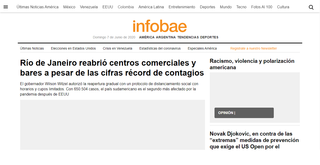This article needs additional citations for verification .(August 2021) |
Chilango is a monthly entertainment Mexican magazine launched in 2003 in Mexico City.
This article needs additional citations for verification .(August 2021) |
Chilango is a monthly entertainment Mexican magazine launched in 2003 in Mexico City.
The magazine Chilango was launched by Mexican press group Grupo Expansión (then owner of magazines Expansión and Quien) [1] in November 2003 as a Mexican equivalent to Time Out . [2] In the early 21st century, Chilango became an accepted demonym for people from Mexico City. The self-acceptance of the term lead to the publication of the magazine as a way to subvert prejudices that people from the inner states of Mexico had about chilangos, originally created and intended by them as an offensive name.
In 2014, the businessman César Pérez Barnes bought Grupo Expánsion and Chilango from Time Inc.. [3]
In 2017, Grupo Expánsion was sold again, to the advertising company Cinco M Dos owned by Édgar Farah, but the magazine Chilango had been sold separately to Gustavo Guzmán, also owner of the magazine Más por Más. [3]
In 2023, the magazine launched its own radio station in Mexico City, Radio Chilango. The radio broadcasts on regular FM waves and online. [2] The concession of the 105.3 MHz frequency (by Eduardo Henkel) came with the rights for the magazine to broadcast television content and provide telecommunication services. [4]
The magazine is owned and managed by the branded content agency Capital Digital (owner of Pictoline, UnoCero, Sopitas, Más por más). [2] Sections of the magazine include:
During its first years, the magazine's slogan was a spoof of the racist "haz patria y mata un chilango" (perform patriotism and kill a chilango), marked as "haz patria y ama a un chilango" (perform patriotism and love a chilango). Later issues included new phrases such as "la ciudad que vale la pena vivir" (the worthy city to live) or "haz patria y levantamiento de tarro olímpico" (perform patriotism and olympic beer mug lifting).

Bronco is a Mexican grupero band originating from Apodaca, Nuevo León. Their modern take on regional Mexican music in the 1980s and 1990s helped earn them international recognition with original band members José Guadalupe "Lupe" Esparza, Ramiro Delgado, Javier Villareal, and José Luis "Choche" Villareal creating music that would go on to top record charts. The band is well known for their use of modern instruments, particularly the synthesizer and musical keyboards, as part of the incorporation of pop-style music. As with many grupera bands, members wore matching jumpsuits.
Grupo Televisa, S.A.B., simply known as Televisa, is a Mexican telecommunications and broadcasting company. A major Latin American mass media corporation, it often presents itself as the largest producer of Spanish-language content.
Chilango is a Mexican slang demonym for natives of Mexico City. The Royal Spanish Academy and the Mexican Academy of Language give the definition of the word as referring to something "belonging to Mexico City", in particular referring to people native to Mexico City.

Grupo Bimbo, S.A.B. de C.V. is a Mexican multinational food company with a presence in over 33 countries located in the Americas, Europe, Asia and Africa. It has an annual sales volume of 15 billion dollars and is listed on the Mexican Stock Exchange with the ticker BIMBO.

Politécnico metro station is a Mexico City Metro station in Gustavo A. Madero, Mexico City. It is an at-grade station with two side platforms that serves as the northern terminus of Line 5. It is followed by Instituto del Petróleo station. Politécnico station serves the colonias (neighborhoods) of Industrial Vallejo and Nueva Industrial Vallejo. The station's pictogram features the logo of the National Polytechnic Institute (IPN), a public university in Mexico City, and its name is on account of its proximity to the main campus.

Grupo Firmas Globales is a Mexican media conglomerate with holdings in broadcast television, radio, publishing and entertainment.
Tekom Municipality is a municipality in the Mexican state of Yucatán. Tekom is also the name of the municipality's largest settlement and seat of the municipal government. In the XII national census conducted by INEGI in 2000, Tekom municipality recorded a population of 2,660 inhabitants. In the intermediate census count undertaken by INEGI in 2005, the total municipal population was recorded as 2,933 inhabitants, 2,413 of whom spoke one of the recognised indigenous languages of Mexico.
This is a list of Mexico's 37 most-wanted drug lords as published by Mexican federal authorities on 23 March 2009. According to a BBC Mundo Mexico report, the 37 drug lords "have jeopardized Mexico national security."

Roberto Alcántara Rojas is a Mexican entrepreneur and businessman, mainly dedicated to passenger transportation through land and air services. He is the chairman of the board of directors of Grupo IAMSA, one of the main passenger transportation consortiums in Mexico. He also has a 9.3% stake in the media conglomerate Grupo Prisa.

Miguel Ángel Mancera Espinosa is a Mexican lawyer and politician who works with the Party of the Democratic Revolution (PRD).[A] He served as the Mayor of Mexico City from 2012 to 2018. Mancera graduated from the Faculty of Law of the National Autonomous University of Mexico (UNAM) in 1989, and he was awarded the Gabino Barreda Medal two years later for being the best student of his class. He has a master's degree from the University of Barcelona and the Metropolitan Autonomous University and a Juris Doctor from the UNAM.

Pequeño Seúl is a Koreatown in Mexico City. Most of the city's Korean population lives in and around the Zona Rosa.

Infobae is an international Argentine online newspaper. It was launched in 2002 by businessman Daniel Hadad, with the original headquarters in Buenos Aires. The company expanded globally with local editions in New York City, Mexico City, Miami, Bogotá, São Paulo, Lima, and Madrid, all led by Marcos Stupenengo. The expansion increased Infobae's international audience, becoming one of the most read Spanish-language online newspapers worldwide.
XHINFO-FM is a radio station in Mexico City. XHINFO-FM is owned by XEFAJ, S.A. de C.V., a company controlled by Eduardo Henkel Rojas. It is presently operated by Capital Digital, owner of Chilango magazine, and is known as Radio Chilango.

Nopalera metro station is a station of the Mexico City Metro in the colonia (neighborhood) of Miguel Hidalgo and the barrio of Santa Ana Zapotitlán, in Tláhuac, Mexico City. It is an elevated station with two side platforms, served by Line 12, between Olivos and Zapotitlán metro stations. The name of the station alludes to the numerous pig and poultry farms that used to occupy the area, and to the nopal cactuses that used to grow on their fields. Similarly, the pictogram for the station depicts the outline of a flowering nopal. The station was opened on 30 October 2012, on the first day of service between Tláhuac and Mixcoac metro stations.

Zapotitlán metro station is a station of the Mexico City Metro in the town of Santiago Zapotitlán and in the colonia (neighborhood) of Conchita Zapotitlán, in Tláhuac, Mexico City. It is an elevated station with two side platforms, served by Line 12, between Nopalera and Tlaltenco metro stations. The station's pictogram features the glyph of Santiago Zapotitlán, which shows a toothed sapote tree with three branches. The station was opened on 30 October 2012, on the first day of service between Tláhuac and Mixcoac metro stations.

Tlaltenco metro station is a Mexico City Metro station in Tláhuac, Mexico City. It is an at-grade station with one island platform, served by Line 12, between Zapotitlán and Tláhuac metro stations. Tlaltenco metro station serves the town of San Francisco Tlaltenco, from which it receives its name. The station's pictogram features a stone gateway known as La Puerta. The station was opened on 30 October 2012, on the first day of the Mixcoac–Tláhuac service.

The Sistema de Transporte Público Cablebús, simply branded as Cablebús, is an aerial lift transport system that runs in the Gustavo A. Madero and Iztapalapa areas of Mexico City. It is operated by Servicio de Transportes Eléctricos, the agency responsible for the operation of all trolleybus and light rail services in Mexico City. Line 1 was officially inaugurated on 11 July 2021, going from the Indios Verdes station of the STC Metro to the northern neighborhoods of Gustavo A. Madero. Line 2 runs from the Constitución de 1917 to the Santa Marta STC Metro stations in the southeast of the city.

Grupo Firme is a regional Mexican band based in Tijuana, Baja California, that specializes in Sinaloan music. Formed in 2014, they have received nominations for a variety of awards that include Premios Juventud and Premio Lo Nuestro, being the winner in 2021 of the latter in five categories.